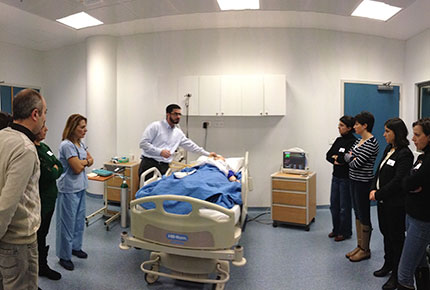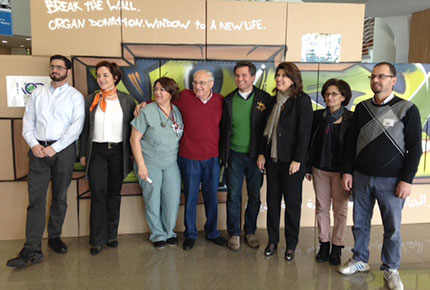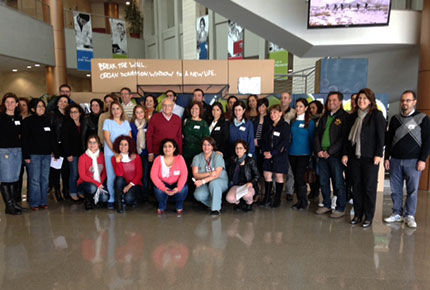Saving lives even in death
LAU School of Medicine hosts first-of-a-kind workshop on organ donation
“ER and ICU physicians have to do everything they can to save the patient,” stressed Dr. Fayez Abillama to a group of nurses and doctors gathered around a mannequin on a hospital bed in LAU’s state-of-the-art Clinical Simulation Center. “However, the physicians should always bear in mind, when they receive a patient who could evolve to brain death, that organ donation can save a lot of lives,” he added.
A critical care physician at LAU’s University Medical Center–Rizk Hospital (LAU Medical Center–Rizk Hospital), Abillama joined several other doctors — among whom instructors Dr. Rechdi Ahdab LAU Medical Center–Rizk Hospital neurologist and Dr. Georges Juvelekian critical care physician from St Georges Hospital — in leading a workshop on organ donation and transplantation at the simulation center on the Byblos campus on January 17. The workshop was the first of its kind in Lebanon, made possible by “the fact that we have the most advanced simulation center in the country that allows us to be a regional hub for this kind of training,” emphasized Dr. Vanda Abi Raad, an associate professor of Anesthesiology and the center’s director.
Throughout the morning, 30 participants—doctors and nurses from all over Lebanon—split in groups of 10 and rotated around three stations representing the stages involved in the evolution of a critical care patient into an organ donor. These included the admission into the Emergency Room, the moment at which the patient is pronounced brain dead and the subsequent effort to keep him or her in a stable condition in order to protect the organs while waiting for the recipients to be prepared for surgery.
Afterwards, the workshop participants trained with standardized patients, actors who represented the family of a brain-dead patient who had to be convinced to allow their loved one’s to be an organ donor. This special workshop was organized by Boutros Ghanem, psychologist at USJ, and Dr. Nadia Asmar, associate director of the simulation center and director of simulation programs at SOM. “In Lebanon, the donor culture is still very low,” explained Dr. Wissam Faour, assistant professor of pharmacology at SOM and LAU’s School of Nursing. “There are many reasons for this, such as mistaken beliefs in religious restrictions and fear of mutilating the body.”
Faour played an active role in organizing the workshop, as the Lebanese coordinator for the European-Mediterranean Postgraduate Program in Organ Donation and Transplantation (EMPODAT). The workshop at Byblos was the culminating event of a three-day training program on organ procurement offered as a joint activity by SOM, EMPODAT and Lebanon’s National Organization for Organ and Tissue Donation and Transplantation (NOOTDT).
According to NOOTDT Vice President Dr. Antoine Stephan—who is also a nephrologist at LAU Medical Center–Rizk Hospital—the joint training is a direct result of the Lebanese Ministry of Health’s recent decision to include organ donation and transplantation in the curriculum of all seven Lebanese medical schools. “The aim is to train the trainers,” says Stephan. “There is a universal shortage of donors and we want to make sure that the coming generation of doctors and nurses is tuned to the importance of ensuring that we are able to procure enough organs to save the lives of people who spend years on donation waiting lists.”
Judging by the enthusiastic response of the participants, the training resulted in exactly the outcome Stephan hoped for. Mariana Adra, who teaches Adult Care Nursing at the American University of Beirut plans on introducing new courses on the topic of organ donation next year. “I will definitely pass the message on to my students,” she said.
More
Latest Stories
- The School of Engineering Delivers Immersive Learning Experiences
- Consultants in the Making
- LAU Marks Rare Disease Day With a Call for Collaboration
- First Pulsed-Field Ablation in Lebanon Takes Place at the LAU Medical Center
- LAU New York Becomes a Degree-Granting Campus
- Health Science Students Win at the Annual Colorectal Awareness Walkathon
- The Power of Creative Expression in Times of Crisis
- Learning Arabic: One Summer Program, Infinite Possibilities




